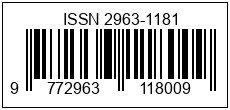Pengaruh Kepemimpinan Otoriter dan Komitmen terhadap Loyalitas Kinerja Humas Kepolisian pada Institusi Polda Bali
DOI:
https://doi.org/10.55681/economina.v3i8.1465Keywords:
Authoritarian Leadership, Commitment, LoyaltyAbstract
This study aims to analyze the influence of authoritarian leadership and commitment on the loyalty of public relations employees of the Bali Police. The sample of this study is 45 people in the Bali Police. The type of research used is quantitative. Data collection was carried out by observation and questionnaires. The instruments used in this study are validity test, reliability test, classical assumption test.
The results of this study show that (1) the influence of authoritarian leadership has a positive and significant influence on loyalty with a significance value smaller than the predetermined alpha level (0.001 ≤ 0.05), so that the first hypothesis (H1) is accepted, (2) Commitment has a positive and significant influence on loyalty with a significance value smaller than the predetermined alpha level (0.000 ≤ 0.05) indicating that the second hypothesis (H2) is acceptable.
Authoritarian leadership and commitment together affect loyalty It can be seen that the contribution between authoritarian leadership and commitment to performance loyalty is 67.6%, while 32.4% is influenced by other variables that are not studied. This indicates that authoritarian leadership and commitment are two factors that greatly affect performance loyalty.
Downloads
References
Adityo, Rizki. (2017). Analisis Kepemimpinan, Kompensasi, dan Kepuasan Kerja terhadap Kinerja Direktorat Pengaman Objek Vital Kepolisian Daerah Jawa Timur. Surabaya: Penerbit Politeknik Elektronika Negeri Surabaya.
Asri Laksmi Riani. (2011). Pengaruh Kemampuan, Kepribadian, dan Minat Kerja terhadap Kinerja Karyawan. Jakarta: Gramedia.
Becker, Gary S. (1993). Human Capital: A Theoretical and Empirical Analysis, with Special Reference to Education. Chicago: The University of Chicago Press.
Bernadine, Mas’ud. (2004). "Indikator Kinerja Karyawan". Dalam Jurnal Manajemen Bisnis, 3(2), 45-56.
Bintarti. (2015). Metode Penelitian Kuantitatif: Panduan Penelitian untuk Ilmu-Ilmu Sosial. Jakarta: PT RajaGrafindo Persada.
Dessler, Gary. (2006). Human Resource Management. New Jersey: Prentice Hall.
Fajri, Istiqomah Qodriani. (2018). Teori dan Praktik Kepemimpinan. Yogyakarta: Pustaka Pelajar.
Hardianti. (2016). Manajemen Kepemimpinan. Jakarta: Bumi Aksara.
Hasibuan, Malayu S.P. (2013). Manajemen: Dasar, Pengertian, dan Masalah. Jakarta: Bumi Aksara.
Hadi Hermansyah. (2018). Peningkatan Kinerja yang Dipengaruhi oleh Gaya Kepemimpinan, Komunikasi, serta Budaya Organisasi: Studi pada Anggota Kepolisian Republik Indonesia. Jakarta: Penerbit Kepolisian RI.
Hasibuan, Malayu S.P. (2016). Manajemen Sumber Daya Manusia. Jakarta: Bumi Aksara.
Heidjrachman, R. & Husnan, Suad. (2018). Manajemen Personalia. Yogyakarta: BPFE-Yogyakarta.
Hersey, Paul. (2020). Situational Leadership. New York: Addison-Wesley.
Downloads
Published
How to Cite
Issue
Section
License
Copyright (c) 2024 I Dewa Nyoman Usadha, I Putu Nadiyasa

This work is licensed under a Creative Commons Attribution-ShareAlike 4.0 International License.












